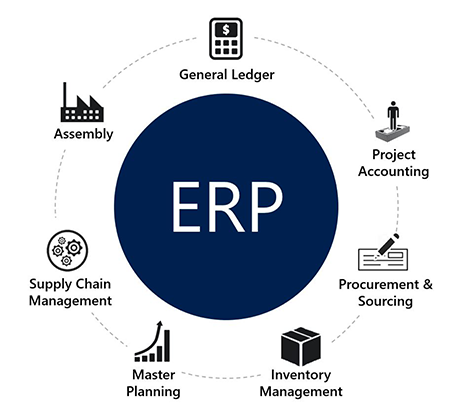Describe enterprise resource planning (ERP)
Enterprise resource planning (ERP) is business process management software that manages and integrates a company's financials, supply chain, operations, reporting, manufacturing, and human resource activities. Fundamentally, ERP software enables you to run the core processes of a business.
Generally, ERP software consists of a set of integrated business functions that automate back-office processes including procurement, inventory management, and assembly. Organizations can gain a real-time view across their operations by using one central database. The following illustration depicts business functions supported by an ERP system.

An effective ERP system allows an organization to analyze transactional data, resulting in more streamlined processes and greater efficiency.
Introducing Dynamics 365
Dynamics 365 is a set of intelligent business applications that work together seamlessly. It provides customer relationship management (CRM) opportunities for marketing, customer service, field service, and sales through its customer engagement apps. Dynamics 365 also covers operations, finance, commerce, and human resources through its finance and operations apps. Dynamics 365 combines CRM and ERP capabilities by bringing them together in a powerful set of applications and moving them to the cloud. Although CRM and customer engagement apps are an important part of the Dynamics 365 suite of applications, this module focuses on ERP and finance and operations apps.
Dynamics 365 connects with Microsoft Power Platform and Microsoft Dataverse for insights, innovation, and connectivity between your data and your business processes. Dynamics 365 consists of transactional applications, like Business Central, and finance and operations applications that help your organization automate processes and increase efficiency.
Finance and operations apps help businesses manage their global financial systems, operational business processes, and streamlined supply chains to empower people to make fast, informed decisions.
Finance and operations apps
Dynamics 365 Finance helps you redefine your traditional global financial management to monitor performance in real time, predict future outcomes, and make data-driven decisions to drive business growth. You can automate processes to manage financial complexities, increase efficiency, and decrease operational expenses.
Dynamics 365 Supply Chain Management empowers employees and organizations with the ability to obtain a unified view of inventory, warehouse, manufacturing, service, and logistics with predictive analytics that turn data into insights to support better strategic decisions. It brings agility and efficiency to manufacturing by connecting and optimizing production planning, scheduling, operations, and cost management. It gives you real-time visibility into warehousing and transportation business processes to reduce costs, reduce delivery time, and increase accuracy.
Dynamics 365 Commerce delivers a comprehensive solution that unifies your back-office, in-store, call center, and digital experiences. Commerce enables you to build brand loyalty through personalized customer engagements, increase revenue with improved employee productivity, and optimize operations to reduce costs and drive supply chain efficiency, delivering better business outcomes.
Dynamics 365 Human Resources provides the workforce insights you need to build data-driven employee experience. Human Resources can improve organizational agility, optimize programs, discover workforce insights, and transform employee experiences. Your human resources team can centralize personnel data, automate processes, and enable self-service.
Dynamics 365 Project Operations provides the visibility, collaboration, and agility needed to drive success across the project-centric business—from prospects to payments to profits. It connects sales, resourcing, project management, and finance teams in a single application to win more deals, accelerate project delivery, and maximize profitability.
Dynamics 365 Business Central
Dynamics 365 provides a business management solution named Business Central for small and mid-sized organizations. Business Central automates and streamlines business processes within areas such as finance, manufacturing, sales, shipping, project management, and services. Finance and operations apps, however, provide an enterprise solution targeted to complex organizations.
There are several other important differences between Business Central and finance and operations apps. Business Central can be implemented for a single user, whereas finance and operations apps require a minimum of 20 users for implementation. Business Central is also an all-in-one solution, whereas finance and operations apps allow you to choose which functionalities you want to add. Finance and operations apps have a greater depth of functionality than Business Central. A process that takes a few steps to configure in Business Central might take two to three times as many in finance and operations apps because of the complex and advanced functionalities available in the finance and operations apps.